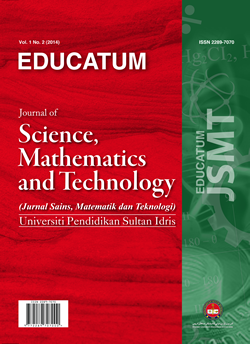COVID-19 Disease Knowledge among Biology Students: Implication for Science Education in the Post-COVID-19 Era
DOI:
https://doi.org/10.37134/ejsmt.vol11.1.6.2024Keywords:
COVID-19 Disease, STEM Students, Undergraduates, Knowledge, Science EducationAbstract
This research investigated the COVID-19 knowledge of 116 undergraduate Biology Education students and its implications for science education in the Fourth Industrial Revolution. Employing a non-experimental descriptive survey design, data were collected via an online questionnaire titled "Knowledge of COVID-19 Disease Questionnaire" (KCDQ), with a reliability coefficient of 0.72. The questionnaire comprised 42 dichotomous items. The study addressed four research questions and one hypothesis. Data analysis involved the use of Median, Standard Deviations, and Independent-Samples T-test. The findings show that undergraduate Biology Education students exhibit a high level of knowledge about COVID-19. The high-level knowledge of undergraduate Biology Education students on COVID-19 indicates that science education in the Fourth Industrial Revolution can build on a strong foundation of disease understanding. However, further research can explore ways to deepen their understanding and integrate current health challenges into science education curricula to promote health literacy in future scientists and contribute to the preparedness for similar health crises.
Downloads
References
Anderson, I. K. (2006). The relevance of science education: As seen by pupils in Ghanaian junior secondary schools (Doctoral dissertation, University of the Western Cape).
Odufuwa, T. T., Adelana, O. P., & Adekunjo, M. A. (2022). Assessment of senior secondary students’ perceptions and career interest in science, technology, engineering and mathematics (STEM) in Ijebu-Ode Local Government Area, Ogun State. Journal of Science, Technology, Mathematics and Education (JOSTMED), 18(1), 146
Nnamdi, E. B. (2014). The role of Chemistry Education in National Development. The International Journal of Engineering and Science, 3(3): 12-17.
Jessani, S. I. (2015). Science education: Issues, approaches and challenges. Journal of Education and Educational Development, 2(1).
Nwachukwu, C. O. (2012). Revisiting science education and national development: Nigerian situation and the way forward. Kuwait Chapter of Arabian Journal of Business and Management Review, 33(846), 1-21.
Obi, Z. C., & Obiadazie, R. E. (2014). Science education for sustainable development: A need for Nigeria. COOU Interdisciplinary Research Journal. Maiden Issue, 44, 50.
Nwagbo, C. & Uzoamaka, U. C. (2011). Effects of biology practical activities on student's process skill acquisition. Journal of Science Teachers Association of Nigeria
Baba, G. I. (2017). The role and challenges of chemistry education in small and medium scale industries for science and technology education for the development of sustainable society in Nigeria. Being a paper presented at 2nd National science education conference held at Saadatu Rimi College of Education, Kumbotso, Kano, on 31st October-3rd November.
Ajayi, O. A. & Adelana, O. P. (2020). Effectiveness of multimedia self-learning package in teaching and learning of genetics in secondary schools. Journal of Psychometry and Assessment Techniques, 1 (1), 119-126
Adelana, O. P., Ishola, A. M., & Adeeko, O. (2021). Development and Validation of Instructional Package for Teaching and Learning of Genetics in Secondary Schools. Asian Journal of Assessment in Teaching and Learning, 11(2), 32-41.
Ahmad, S. I., Abubakar, B. B., & Yau, S. (2018). Biology education a panacea for sustainable national development. Frontiers in Environmental Microbiology, 4(2), 71-74.
Eurosurveillance Editorial Team. (2020). Note from the editors: World Health Organization declares novel coronavirus (2019-nCoV) sixth public health emergency of international concern. Eurosurveillance, 25(5), 200131e.
World Health Organization declares novel coronavirus (2019-nCoV) sixth public health emergency of international concern. Eurosurveillance, 25(5), 200131e.
Erfani, A., Shahriarirad, R., Ranjbar, K., Mirahmadizadeh, A., & Moghadami, M. (2020). Knowledge, attitude and practice toward the novel coronavirus (COVID-19) outbreak: a population-basedsurvey in Iran. Bull world Health organ, 30(10.2471), 10-2471.
Olaimat, A. N., Aolymat, I., Elsahoryi, N., Shahbaz, H. M., & Holley, R. A. (2020). Attitudes, anxiety, and behavioral practices regarding COVID-19 among university students in Jordan: a cross-sectional study. The American journal of tropical medicine and hygiene, 103(3), 1177.
Pagnini, F., Bonanomi, A., Tagliabue, S., Balconi, M., Bertolotti, M., Confalonieri, E., & Villani, D. (2020). Knowledge, concerns, and behaviors of individuals during the first week of the coronavirus disease 2019 pandemic in Italy. JAMA network open, 3(7), e2015821-e2015821.
Odriozola-González, P., Planchuelo-Gómez, Á, Irurtia, M. J., & de Luis-García, R. (2020). Psychological effects of the COVID-19 outbreak and lockdown among students and workers of a Spanish university. Psychiatry research, 290, 113108.
Gohel, K. H., Patel, P. B., Shah, P. M., Patel, J. R., Pandit, N., & Raut, A. (2021). Knowledge and perceptions about COVID-19 among the medical and allied health science students in India: An online cross-sectional survey. Clinical epidemiology and global health, 9, 104-109.
Centre for Disease Control and Prevention (January, 2022). Animals and COVID-19. https://www.cdc.gov/coronavirus/2019-ncov/daily-life-coping/animals.html
Ilesanmi, O., & Afolabi, A. (2020). Perception and practices during the COVID-19 pandemic in an urban community in Nigeria: a cross-sectional study. PeerJ, 8, e10038.
Iorfa, S. K., Ottu, I. F., Oguntayo, R., Ayandele, O., Kolawole, S. O., Gandi, J. C., & Olapegba, P. O. (2020). COVID-19 knowledge, risk perception, and precautionary behavior among Nigerians: a moderated mediation approach. Frontiers in Psychology, 11, 3292.
Min, J., Kim, Y., Lee, S., Jang, T. W., Kim, I., & Song, J. (2019). The fourth industrial revolution and its impact on occupational health and safety, worker's compensation and labor conditions. Safety and health at work, 10(4), 400-408.
Avedian, A. (2014). Survey design. Harvard Law School.
Glasow, P. A. (2005). Fundamentals of survey research methodology. Retrieved January 18, 2013.
DeCoster, J., Gallucci, M., & Iselin, A. M. R. (2011). Best practices for using median splits, artificial categorization, and their continuous alternatives. Journal of experimental psychopathology, 2(2), 197-209.
Downloads
Published
Issue
Section
License
Copyright (c) 2024 Owolabi P. Adelana, Adetunmbi L. Akinyemi , Idowu R. Oladimeji

This work is licensed under a Creative Commons Attribution-NonCommercial-ShareAlike 4.0 International License.





